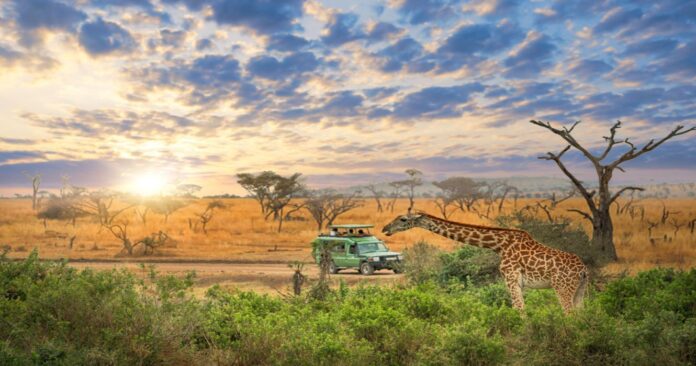East Africa is a huge umbrella that encompasses a vast assortment of countries, landscapes, cultures, and ecosystems. This diversity ensures that there is something for everyone, whether you prefer a hot air balloon ride tour over the Serengeti or a trip to Ethiopia’s historic rock-cut cathedrals.
10 Mount Kilimanjaro, Tanzania
One of Africa’s most iconic sights, Mount Kilimanjaro, is the highest mountain and highest volcano in Africa. It stands at 19, 340 feet (5,895 meters) above sea level. It is the tallest peak to climb in Africa and the highest free-standing mountain in the world. Tourists with reasonable physical fitness and mental health, who are determined and love adventure, are all welcome to try climbing the mountain for an amazing experience. Tourists who want to climb the mountain are required to go with a guide. The climb can take five to nine days, depending on the routes taken and the weather. Tourists are first advised and allowed a few days to acclimate to the altitude before beginning or continuing with the climb.
9 Zanzibar, Tanzania
Zanzibar, famous for its rich cultural history and its beautiful beaches, is located off the coast of Tanzania. It is an island surrounded by the Indian Ocean. Zanzibar was once a stop for traders who were on the spice route. The Arab rulers used to exchange slaves for spices, and this is depicted in the elaborate architecture of the place. One of the biggest attractions on the island is Stone Town, which is a world heritage site. It’s famous for its narrow alleyways, Sultan’s palace, extravagantly ornate houses, and a variety of mosques. Zanzibar’s beaches have perfect white sand; scuba-diving and snorkeling are ideal entertainment on these beaches.
8 Serengeti National Park, Tanzania
Those looking for the best safari experience are should consider merging their visit to Maasai Mara and Tanzania’s Serengeti National Park. Beautiful, broad grasslands with Acacia trees and grazing game can be seen here. It’s an excellent area to see lions and cheetahs in action, especially during the rainy season from January to March. Wildebeest calves in the southern Serengeti at this time of year, and the newborn calves are easy prey for hungry cats. The herds begin their migration to the Maasai Mara in April, although the wildlife watching is excellent all year.
7 Watamu, Kenya
Watamu, unlike many of Kenya’s other seaside communities, is still regarded as a tranquil haven. Watamu, located smack dab in the center of Kenya’s stunning coastline, is modest, laidback, and steeped in history. It is recognized for its beautiful coves and palm-fringed beaches, as well as its abundant coral reefs. Deep-sea fishing is a popular sport, and there are various dive schools where you can learn to scuba-dive. On land, seaside eateries sell fresh seafood. Mida Creek is home to an abundant bird population and the Gedi Ruins provide insight into the lives of Swahili people in the 13th century.
6 Omo River Region, Ethiopia
The Omo River Region, which is part of Africa’s spectacular Great Rift Valley, is one of East Africa’s most inaccessible destinations. Those who are prepared to make the long and tough journey will be rewarded with breathtaking landscapes and the opportunity to visit communities that haven’t been altered in hundreds of years. In this section of Ethiopia, there are many different tribes, each with its own traditional dress, culture, and customs. It is recommended that you join a tour to get the most out of your Omo River experience, as some of them combine cultural trips with white-water rafting on the region’s legendary rapids.
5 Lalibela, Ethiopia
Lalibela is a historic village in Ethiopia’s northern highlands that holds tremendous religious significance for the country’s Orthodox Christians. It was built in the 12th century as a “New Jerusalem,” an alternative for pilgrims who were unable to travel to the Holy Land due to strife. Visitors come from all over the world to see its spectacular rock-hewn churches. Each of the eleven monolithic cathedrals was carved out of the rock face. One of them, Biete Medhani Alem, is thought to be the world’s largest monolithic church. All are testaments to their builders’ devotion.
4 Lake Nakuru National Park, Kenya
The eponymous Lake Nakuru, a soda lake noted for its huge flamingo population, is the park’s showpiece. The number of flamingos in a flock varies depending on the season. Water levels drop during the dry season, and the lake becomes more alkaline, resulting in more algae for the birds to eat. At this time of year, the number of flamingos can reach two million, creating a rose-colored haze on the lake’s surface. Other animals found in the park include lions, rhinos, and nearly 450 different species of birds.
3 Maasai Mara National Reserve, Kenya
The Maasai Mara National Reserve in Kenya has a well-deserved reputation as one of Africa’s most rewarding safari destinations. Wildlife sightings are frequent and diverse, regardless of the season. The Big Five can be seen in a single day, and the plains are flooded with massive herds of wildebeests during their yearly migration. The migration takes place during the dry season, between July and November. Seeing the herds of thousands of animals crossing the Mara River is a sight few will ever forget. Another attraction of this stunning East African reserve is cultural tours to traditional Maasai villages.
2 Volcanos National Park, Rwanda
Rwanda’s Volcanoes National Park lies deep within the Virunga Mountains, shrouded in mist and surrounded by lush vegetation. It is one of the best places in the world to see the critically endangered mountain gorilla, as it is Africa’s oldest national park. There are only about 800 of these remarkable animals left, who are a subspecies of the wider-ranging eastern gorilla. Sharing a moment with them in their natural habitat is an unforgettable experience that should be on the top of any wildlife enthusiast’s bucket list. Several more rare species, including 29 indigenous bird species, call the area home.
1 Ngorongoro Conservation Area, Tanzania
The ancient Ngorongoro Crater dominates Tanzania’s Ngorongoro Conservation Area. The crater, which is about 1,970 feet/600 meters deep, is the world’s largest intact caldera and one of East Africa’s most amazing natural wonders. Countless species, including a major population of critically endangered black rhinos and some of the largest remaining tusker elephants, roam the grassy plains of the crater floor within its rim. Black-maned lions and flocks of flamingos that appear on the crater’s soda lake during the breeding season are also remarkable sights.










